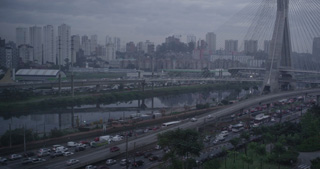Future June
Futuro Junho BRAZIL / 2015 / Portuguese / Color / DCP / 95 min
BRAZIL / 2015 / Portuguese / Color / DCP / 95 min
Director, Script: Maria Augusta Ramos
Photography: Lucas Barbi, Camila Freitas
Editing: Karen Akermen
Sound: Gabi Culnha, Ricardo Zollner
Producers: Maria Augusta Ramos, Jan de Ruiter
Production Companies: Nofoco Filmes, Selfmadefilms, VPRO
Source: Nofoco Filmes / Maria Augusta Ramos
In June 2014, São Paulo was preparing to host the FIFA World Cup. As the big event approached, frustration towards the government’s unreasonable economic and social policies and the state of public investment led to frequent public demonstrations and strikes. By showing the daily lives of four men living with their beloved families and significant others, this film concretely and eloquently depicts the conflict between the profit brought by the global market economy and the unfair reality faced by local communities at the bottom of the ladder.
[Director’s Statement] The city of São Paulo, with a population of nineteen million people, has always fascinated me. Considered the economic powerhouse of Brazil, its financial capital São Paulo is a product of the values and principles of the money economy—the neoliberal model—and it reflects its achievements and failures. In my films, I am interested in portraying human interaction: how people interact with their surroundings—society and community; how they interact with each other and with themselves; their beliefs, dilemmas, and hopes. In Future June, I wanted to look at how the current economic model influences social and human relations. And, ultimately, how the characters’ lives, behavior, their very identities, are defined by these relations.
 Maria Augusta Ramos
Maria Augusta RamosMaria Ramos is a prize-winning documentary maker. She was born in Brasília, Brazil. After graduating from the University of Brasilia, she moved to Europe where she studied Musicology and Electroacoustic Music in Paris and in London at City University. In 1990, she moved to the Netherlands where she entered the Netherlands Film and Television Academy. Her films have been screened in various international film and documentary festivals as well as in the cinemas and on TV. Her first feature documentary Brasília—A Day in February (1995) was awarded the Special Prize of the Jury at the It’s All True–International Documentary Film Festival (São Paulo, Brazil). Other works include: I Think What I Want to Say Is . . . (1993) which was screened at YIDFF ’95; Desi (2000); Justice (2005) which won nine international prizes including the Grand Prix at the Visions du Réel (Nyon), and was screened at YIDFF 2005; Behave (2007); Hill of Pleasures (2013); and Seca (2015).
